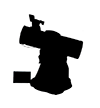Launch Library Telescope Program
Menu
Overview
Started in 2008 by the New Hampshire Astronomical Society, the Library Telescope Program has expanded to over 1,000 libraries in multiple countries, including the USA, Canada, and various parts of Europe (view our world map).
To help you get started, this library guide outlines important issues to consider for your program. While the purchase and maintenance of the equipment are the most obvious issues, a successful program also requires specific checkout policies and procedures for the library telescope, staff and patron training to support the program, marketing and promotion, and ongoing telescope maintenance. We suggest you read these guidelines in their entirety before launching your program.
While adjustments to the guidelines may be needed to fit your library’s unique circumstances, be careful not to stray too far from the methods developed through years of trial and error.

